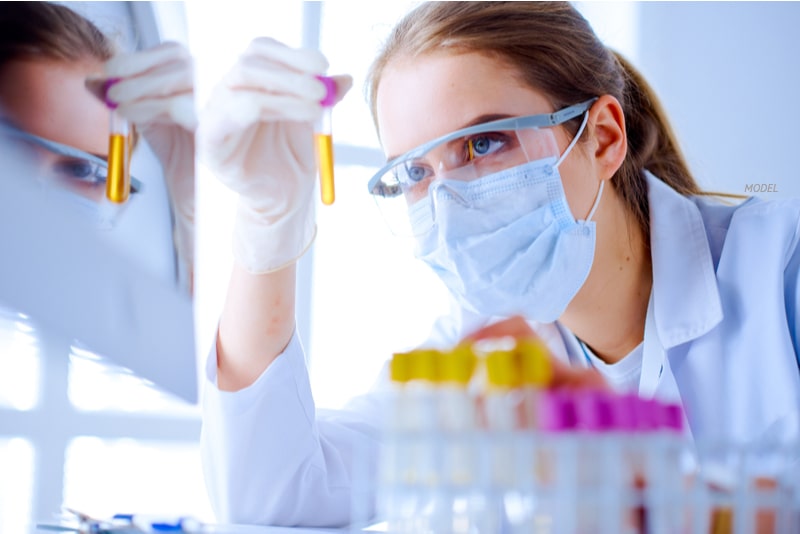4 Minute Read:
If your cosmetic surgeon doesn’t require you to have any lab tests before your surgery, run the other way! It is imperative that all surgical patients requiring general anesthesia be screened before their procedure to help prevent serious complications from arising.

Surgery also puts stress on the body, and these tests help ensure that you are in good health and can tolerate the procedure.
What Is My Surgeon Looking For?
Your doctor needs to know that you haven’t developed any disorder that might interfere with the success of your surgery or complicate your recovery.
Another problem that needs to be avoided is having surgery when you have an infection somewhere in your body, as this can spread and even cause rejection if you are receiving any kind of implant.
Finally, if you have an existing medical condition, you may need more specific testing to ensure that you are healthy enough for surgery.
Which Pre-Surgical Tests Will I Need?
A couple of weeks before your scheduled surgery, you will need to complete your pre-operative testing. We require, at a minimum, a CBC, CMB (for males), and a urinalysis (for females). An EKG is required for all patients over the age of 40 (male or female) and for any patients with previous heart conditions.
The following tests may be required before your procedure:
1. Urinalysis
By analyzing a patient’s urine, doctors can diagnose a number of conditions that the patient may suffer from, including UTI (which is more common in women than men) and any infection(s) that the patient may be dealing with. If an infection is present, plastic surgery will need to be postponed until the infection has been successfully treated.
This basic diagnostic test is routinely performed prior to surgery.
2. CBC With Differential
A CBC (complete blood count) measures various aspects of your blood. These measurements can tell a lot about different factors of your body, such as the quality and amount of red blood cells, white blood cells, and platelets in your body. A CBC with differential will also include an examination of the hemoglobin and hematocrit in your red blood cells.
This test helps identify risks of anemia and infection and is necessary before a surgical procedure.
3. CMP
A CMP (comprehensive metabolic panel) examines the fluid balance in the patient’s body, which can help tell how well the liver and kidneys are functioning. Specifically, a CMP measures the levels of glucose (sugar), electrolytes (sodium, potassium, calcium, chlorine, and carbon dioxide), creatine, blood urea nitrogen, and protein in the blood.
Patients who have had metabolic issues in the past may need this test. If any of these levels come back as unbalanced, the problem must be treated before cosmetic surgery can be performed.
4. HCG
For women, HCG (human chorionic gonadotropin) is a hormone that shows in pregnancy. It is essential that women not be pregnant when they undergo plastic surgery procedures for the safety of the patient and the safety of the fetus.
If there is any chance a female patient might be pregnant, this test should be performed.
5. HIV
If a patient has HIV, plastic surgeons must take extra precautions when performing the procedures. Knowing that a patient is diagnosed with HIV will help the surgeon understand what additional steps must be taken to ensure safety for everyone along with a successful procedure.
6. Chest X-Ray
A chest x-ray allows a patient’s lungs and heart to be examined. Issues with these organs can lead to severe medical problems, such as lung cancer or congestive heart failure. It is important to see if these organs are healthy enough to withstand the trauma brought on by plastic surgery and the recovery process, which can be as taxing on the body as the procedure itself.
An X-ray may be ordered if there is any history of lung or heart concerns.
7. EKG/ECG
Similar to the importance of the chest x-ray is an EKG, or ECG (electrocardiogram). This test measures and records the electrical signals in the heart and can help identify any problems that may be present there, including issues with the arteries and an increased chance of heart attack.
This test is also necessary to rule out any major coronary issues prior to surgery.
8. Complete Physical
Patients over the age of 50 will also need to undergo a complete physical and have medical clearance. This requirement also goes for any patient that has pre-existing medical conditions that require doctors to sign off on their health.
9. Mammogram
Women undergoing plastic surgery involving their breasts must undergo a mammogram to ensure no cancer or abnormalities are present.
Want to Learn More About Plastic Surgery in Miami, FL?
If you want to learn more about pre-surgical lab work or are interested in scheduling a plastic surgery consultation in Miami with Dr. Hochstein, call our offices at (305) 931-3338 or fill out our online contact form above.
Dr. Hochstein is well-known for his holistic approach and offers a full range of cosmetic surgeries and medspa treatments in Miami, Florida, including:
And so much more!